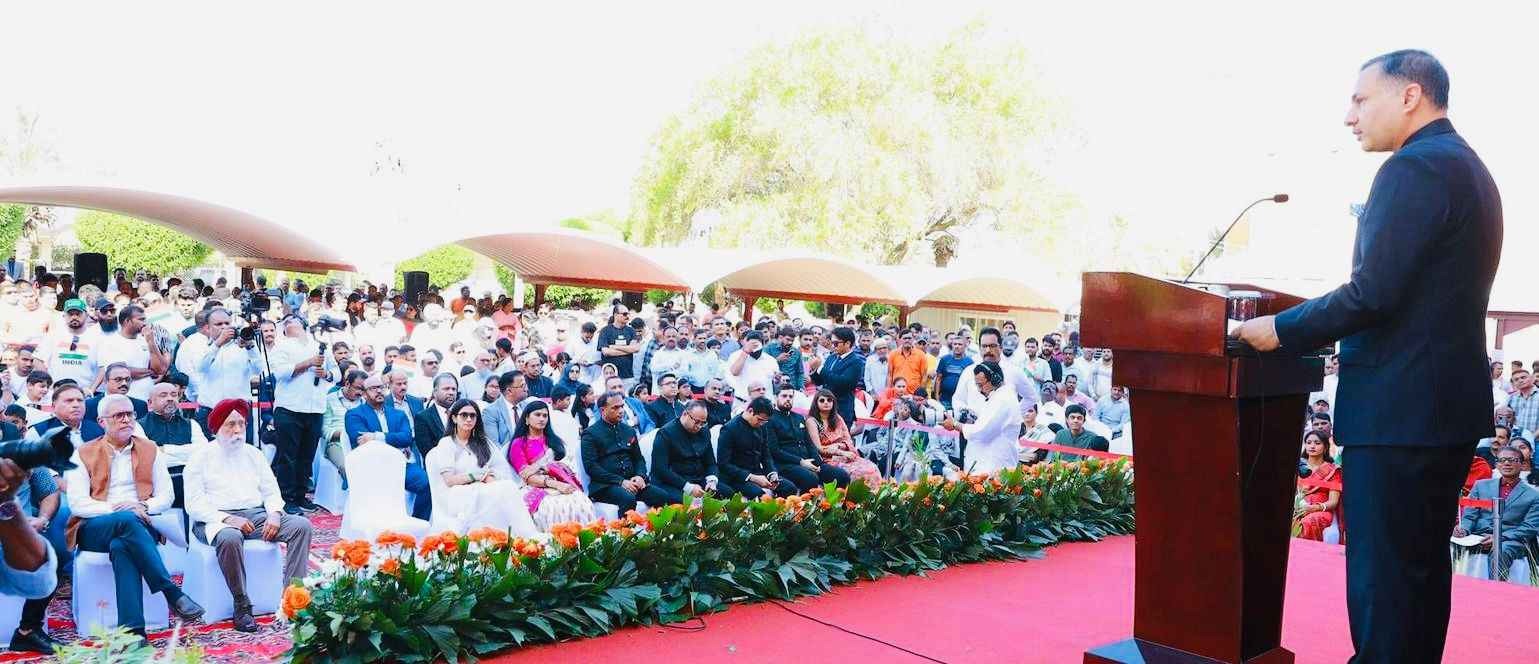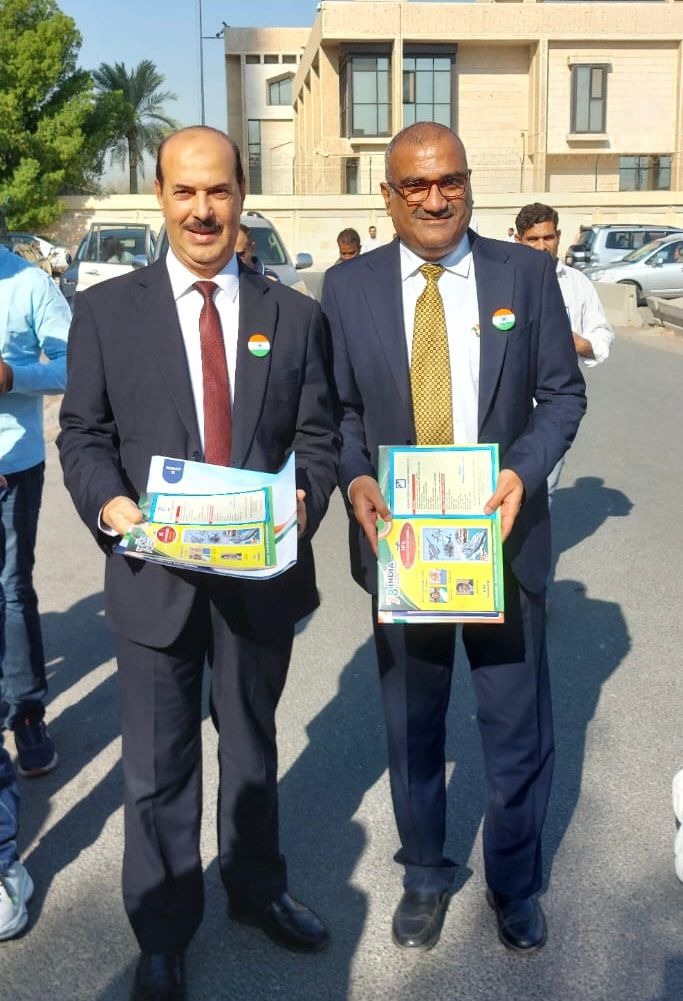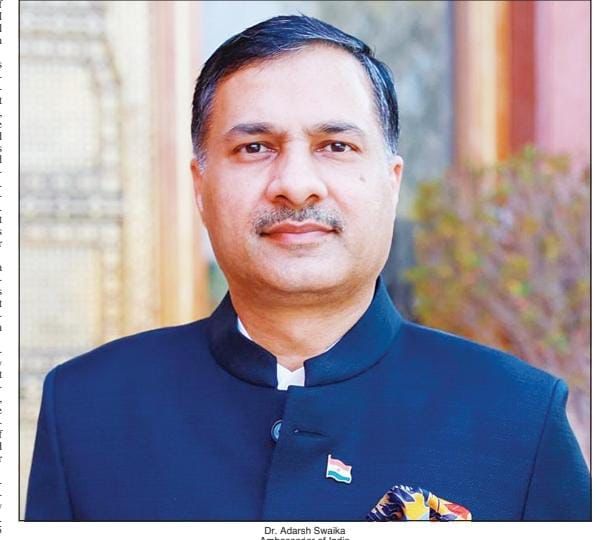-

-

In a significant move to enhance community services, the Ministry of Interior, through a joint effort by the General Department of Criminal Evidence and the General Department of Information Systems, will launch a new service on Sunday, August 18, 2024. This service aims to facilitate biometric fingerprinting for bedridden individuals and those with moderate to severe disabilities, including mental disabilities, directly at their locations.
This initiative reflects the Ministry of Interior’s ongoing commitment to improving access to essential government services for people with special needs and bedridden individuals. By providing this service directly at their locations, the Ministry aims to ensure that these individuals can complete necessary procedures without facing undue hardship.
To streamline the process, the Ministry has provided a dedicated WhatsApp number (94458124) for submitting all required health-related documents. Once the documents are received, individuals will be contacted to schedule an appointment for the biometric fingerprinting procedure.
In addition to this new service, the Ministry of Interior has announced an extension of the fingerprinting deadline for all citizens until September 30, 2024, and for residents until December 31, 2024. After these deadlines, transactions for any citizen or resident who has not completed the biometric fingerprinting will be halted.
The Ministry of Interior’s introduction of this biometric fingerprinting service is a crucial step towards ensuring that all members of the community, especially those with special needs and bedridden individuals, have easy access to essential services. The extension of the fingerprinting deadlines further demonstrates the Ministry's dedication to accommodating the needs of all citizens and residents.
****************************************************
-

-

The Ministry of Health (MOH) has announced its active monitoring of the recent monkeypox outbreak in several African countries. This follows the designation of the outbreak as a "global health emergency" and the identification of a new strain of the virus.
The MOH is collaborating with the Gulf Center for Disease Prevention and the World Health Organization (WHO) to stay abreast of the situation and implement appropriate measures. The Kuwait Center for Disease Prevention and Control (Kuwait CDC) is working diligently with all relevant parties to enhance national efforts to prevent and manage infectious diseases, as reported by Al Qabas.
Monkeypox, or Empox, is a viral disease with two primary subtypes. It is characterized by a rash, blisters, and mucosal lesions, along with symptoms such as fever, headache, muscle pain, weakness, and swollen lymph nodes.
The disease can spread through physical contact with an infected person, including sexual contact, kissing, or direct touch. Respiratory secretions can also transmit the virus. Diagnosis is confirmed through a polymerase chain reaction (PCR) test. Treatment generally involves supportive care to alleviate symptoms, though antivirals may be used in certain cases.
To prevent monkeypox, the Ministry advises maintaining good hand hygiene, using soap and water or alcohol-based sanitizers, avoiding sexual promiscuity, and steering clear of physical contact with symptomatic individuals. Travelers to countries with reported cases are also encouraged to exercise caution.
The Ministry of Health will continue to provide regular updates on the situation. It wishes the public good health and safety.
****************************************************
78th Indian Independence Day Grand Celebrations at the Indian Embassy in Kuwait
- by Akila Jwala
 The 78th Independence Day of India was celebrated with great enthusiasm at the Indian Embassy in Kuwait. His Excellency Dr Adarsh Swaika, the Ambassador of India to Kuwait, had the honour of hoisting the national flag during the ceremony.
The 78th Independence Day of India was celebrated with great enthusiasm at the Indian Embassy in Kuwait. His Excellency Dr Adarsh Swaika, the Ambassador of India to Kuwait, had the honour of hoisting the national flag during the ceremony.
Following the hoisting of the tricolour, the gathering was moved by a stirring rendition of the Indian national anthem.  The President of India's address to the nation was subsequently read out, encapsulating the pride and patriotic fervour that this significant day embodies.
The President of India's address to the nation was subsequently read out, encapsulating the pride and patriotic fervour that this significant day embodies.
In a gesture of reverence, Ambassador Swaika also paid tribute to the statue of Mahatma Gandhi, reflecting on the principles of non-violence and truth that are central to India's independence.
 During his address, the Ambassador proudly spoke of the enduring bond between the Indian and Kuwaiti communities. He elaborated on the strong mutual understanding and cooperation that have been the cornerstone of the relationship between the two countries, underpinned by shared values and mutual respect.
During his address, the Ambassador proudly spoke of the enduring bond between the Indian and Kuwaiti communities. He elaborated on the strong mutual understanding and cooperation that have been the cornerstone of the relationship between the two countries, underpinned by shared values and mutual respect.
Ambassador Swaika assured the gathering that the Indian Embassy remains committed to assisting and supporting the Indian community in Kuwait. He extended warm greetings to all community members present and took the time to engage with them personally, further reinforcing the sense of unity and camaraderie on this auspicious occasion.
 The event was a testament to the vibrant spirit of the Indian diaspora in Kuwait and their deep-rooted connection to their homeland.
The event was a testament to the vibrant spirit of the Indian diaspora in Kuwait and their deep-rooted connection to their homeland.
During the special occasion, copies of the Indian Frontliners Independence Day special magazine were distributed among the gathering.
Photos: Durairaj, Shibu, Ramajeyam
***********************************************************
Independence Day Message
By HE. Dr. Adarsh Swaika, Ambassador of India to Kuwait
1. On the special occasion of India's 78th Independence Day, I extend my heartfelt greetings to all Indian nationals and persons of Indian origin residing in Kuwait. I would also like to convey my profound gratitude to the leadership, government and people of Kuwait for their steadfast support for strong and friendly ties between our two countries. India remains committed to further strengthening and expanding this long-standing partnership.
2. As we celebrate 78 years of independence, it is a significant milestone in our pursuit of a resurgent and self-reliant India, the ‘Aatmanirbhar Bharat’. Prime Minister of India, Shri Narendra Modi outlined Amrit Kaal: Vision 2047: a 25-year roadmap for India's development, aiming for India to become a developed nation by 2047. It is the responsibility of all Indian nationals to work diligently towards this goal.
3. Today, as we celebrate our Independence Day, we take pride in India's many achievements. Our commitment to equitable development has been the cornerstone of various socio-economic policies. The principles of democracy, pluralism, and unity in diversity are deeply embedded in Indian society, guided by the ancient philosophies of 'Sarvadharma Sambhava' (equality of all religions) and 'Vasudhaiva Kutumbakam' (the world is one family), which also shape our foreign policy.
 4. India today is a land of a billion opportunities, with a robust economy that has made significant strides despite global challenges. Our IT sector delivers digital solutions worldwide, and our startup ecosystem is thriving with innovation and technological advancements. India is among the top five global economies, a leader in science and technology, a hub of innovation and IT, known as the 'Pharmacy of the World,' and possesses world-class production and manufacturing capabilities. We are also a key global partner in addressing challenges such as climate change and ensuring food and health security through resilient supply chains.
4. India today is a land of a billion opportunities, with a robust economy that has made significant strides despite global challenges. Our IT sector delivers digital solutions worldwide, and our startup ecosystem is thriving with innovation and technological advancements. India is among the top five global economies, a leader in science and technology, a hub of innovation and IT, known as the 'Pharmacy of the World,' and possesses world-class production and manufacturing capabilities. We are also a key global partner in addressing challenges such as climate change and ensuring food and health security through resilient supply chains.
 5. There has never been a better time to invest in India, with unprecedented momentum in modernizing our physical and digital infrastructure. The 'Make in India, Make for the World' initiative is driving our economy forward, supported by business-friendly reforms that unlock the country's true potential. India has made significant improvements in the World Bank's Ease of Doing Business rankings, the Global Innovation Index, and is recognized as a key driver of the global economy.
5. There has never been a better time to invest in India, with unprecedented momentum in modernizing our physical and digital infrastructure. The 'Make in India, Make for the World' initiative is driving our economy forward, supported by business-friendly reforms that unlock the country's true potential. India has made significant improvements in the World Bank's Ease of Doing Business rankings, the Global Innovation Index, and is recognized as a key driver of the global economy.
6. On the international stage, India continues to play a vital role in promoting global peace, stability, and prosperity. Our leadership in global bodies has been significant, particularly during the past year's successful hosting of the G20 and SCO Summits. India believes in resolving disputes through dialogue and diplomacy, upholding multilateralism, and taking leadership on global issues of relevance and concern such as cross-border terrorism, climate change, energy and food security etc, and reforming multilateral institutions like the UN Security Council.
 7. Bilateral relations with Kuwait continue to progress, with increased engagement at various levels and growing trade and investments. Our cultural connections
7. Bilateral relations with Kuwait continue to progress, with increased engagement at various levels and growing trade and investments. Our cultural connections
resonate well with our Kuwaiti friends, and people-to-people contacts form the foundation of our bilateral relations.
8. The Indian Embassy prioritizes the welfare and well-being of the large Indian community in Kuwait, serving as a 'Home Away from Home.' I extend my appreciation to Indian community associations, professional bodies, cultural groups, and media representatives for their efforts in supporting the community and strengthening India-Kuwait relations.
9. On this proud and joyous occasion of India's 78th Independence Day, I wish every Indian in Kuwait and all friends of India in Kuwait, success, good health and happiness.
August 15, 2024





























Visit of External Affairs Minister Dr. S. Jaishankar to Kuwait (August 18, 2024)
August 15, 2024
1. External Affairs Minister (EAM) Dr. S. Jaishankar will pay an official visit to the State of Kuwait on 18 August 2024. During the visit, EAM will meet the Foreign Minister of the State of Kuwait H.E. Mr. Abdullah Ali Al-Yahya. He is also expected to call on the leadership of the State of Kuwait.
2. EAM’s visit will enable both sides to review various aspects of our bilateral relations including political, trade, investment, energy, security, cultural, consular and people-to-people contacts as well as exchange views on regional and international issues of mutual interest.
New Delhi
August 15, 2024
President's Speech
My Dear Fellow Citizens,
 I extend to you all my heartiest Independence Day greetings. I am delighted to see the nation prepare to celebrate the 78 th Independence Day. Witnessing the tri-colour unfurl on this occasion, be it at the Red Fort, at state capitals or in local neighbourhoods, always thrills our hearts. It is an expression of the joy of being part of our great nation along with more than 1.4 billion fellow Indians. Just as we celebrate various festivals with our families, we celebrate our Independence Day and Republic Day with our family that comprises our fellow citizens.
I extend to you all my heartiest Independence Day greetings. I am delighted to see the nation prepare to celebrate the 78 th Independence Day. Witnessing the tri-colour unfurl on this occasion, be it at the Red Fort, at state capitals or in local neighbourhoods, always thrills our hearts. It is an expression of the joy of being part of our great nation along with more than 1.4 billion fellow Indians. Just as we celebrate various festivals with our families, we celebrate our Independence Day and Republic Day with our family that comprises our fellow citizens.
On 15 th of August, in all parts of the country and also abroad, Indians participate in the flag-hoisting ceremonies, sing patriotic songs, and distribute sweets. Young children participate in cultural events. When we hear them talking about our great nation and about the privilege of being a citizen of it, we find in their words echoes of what our great freedom fighters used to say. Then we realise that we are part of a chain that binds the dreams of those who participated in the freedom struggle and the aspirations of those who will witness the nation regaining its full glory in the years to come.
Realising that we are links of this chain of history is humbling. It makes us recall the days when the nation was under a foreign rule. Patriotic and brave souls took immense risks and made supreme sacrifices. We salute their memory. Thanks to their unceasing labour, the soul of India awoke from centuries of torpor. Different traditions and values that had continued to live on beneath the surface found new expressions in several generations of great leaders. Unifying the diversity of traditions and their expressions was Mahatma Gandhi, Father of the Nation and our lodestar.
Alongside, there were great leaders like Sardar Patel, Netaji Subhas Chandra Bose and Babasaheb Ambedkar as well as Bhagat Singh, Chandrashekhar Azad and many others. It was a nationwide movement, in which all communities participated. Among tribals, there were Tilka Manjhi, Birsa Munda, Laxman Naik and Phulo-Jhano, among many more whose sacrifices are now being appreciated. We have started celebrating the birth anniversary of Bhagwan Birsa Munda as Janjatiya Gaurav Divas. Celebrations of his 150th birth anniversary next year will be an opportunity to further honour his contribution to the national re-awakening.
My Dear Fellow Citizens,
Today, on 14th August, the nation is observing Vibhajan Vibhishika Smriti Diwas, a day to recall partition horrors. As the great nation was divided, millions had to suffer forced migration, lakhs of people lost their lives. A day before we celebrate Independence Day, we recall that unparalleled human tragedy and stand with the families that were torn asunder.
We are celebrating the 75 th year of the Constitution. The journey of the newly independent nation was not without obstacles. Remaining firm on the Constitutional ideals of justice, equality, liberty and fraternity, we are on the mission to enable India to reclaim its rightful position on the global stage.
As general elections were held in our country this year, the number of eligible voters stood at nearly 97 crore. This was a historic record, making it the largest electoral exercise humankind has ever witnessed. The Election Commission of India should be congratulated for the smooth and flawless conduct of such a gigantic event. I thank all officials and security personnel who braved the heat and helped electors. When such a large number of people exercise their franchise, it is a resounding vote for the idea of democracy. India's successful conduct of elections strengthens democratic forces around the world.
Dear Fellow Citizens,
From 2021 to 2024, India has been among the fastest growing major economies, with an average growth rate of 8 percent annually. This has not only put more money in the hands of people, it has also drastically reduced the number of people living below the poverty line. As for those who continue to suffer from poverty, all efforts are being made not only to provide a helping hand to them, but also to bring them out of it. For example, the PM Garib Kalyan Anna Yojana, launched in the initial phase of Covid-19, continues to provide free ration to about 80 crore people, which also ensures that those who have recently come out of poverty are not forced back into it.
It is a matter of pride for all that India has become the fifth largest economy in the world, and we are also poised to become one of the top three economies soon. This has been made possible only by tireless hard work of farmers and workers, by the farsightedness of planners and wealth-creators, and by the visionary leadership.
Farmers, our Annadata, have ensured that agricultural production continues to beat expectations. With this, they have contributed immensely to making India self-reliant in agriculture and feed our people. Infrastructure has received a boost in recent years. Strategic planning and effective institutions have helped expand the network of roads and highways, railways as well as ports. Considering the great potential of futuristic technology, the Government has vigorously promoted a range of sectors, such as semiconductors and Artificial Intelligence, while also creating an ideal ecosystem for startups which will propel their growth. It has made India an even more attractive investment destination. With greater transparency, the banking and financial sector has become much more efficient. All of these factors have set the stage for the next generation of economic reforms and economic growth that will catapult India among the developed nations.
This rapid but equitable progress has given India a higher stature in global affairs. After the successful completion of its G-20 Presidency, India has consolidated its role as the voice of the Global South. India intends to use its influential position to expand the scope of world peace and prosperity.
My Dear Fellow Citizens,
We must remember the words of Dr. B. R. Ambedkar, the architect of our Constitution. He had rightly said, and I quote, “We must make our political democracy a social democracy as well. Political democracy cannot last unless there lies at the base of it social democracy.” [Unquote] The steady progress of political democracy testifies to the progress made towards the consolidation of social democracy. The spirit of inclusion pervades every aspect of our social life. We move together as a cohesive nation with our diversity and plurality.
Affirmative action must be strengthened as an instrument of inclusion. I firmly believe that in a vast country like ours, tendencies that stoke discord based upon perceived social hierarchies have to be rejected. Social justice is a top priority of the Government, and it has taken a number of unprecedented initiatives for the welfare of the Scheduled Castes, Scheduled Tribes and other marginalised sections of society. Pradhan Mantri Samajik Utthan evam Rozgar Adharit Jankalyan, that is, PM-SURAJ, for example, aims to provide direct financial assistance to the people from the marginalised communities. The Pradhan Mantri Janjati Adivasi Nyaya Maha Abhiyan or PM-JANMAN has taken the form of a mass campaign for critical interventions to improve socio-economic conditions of Particularly Vulnerable Tribal Groups, that is, PVTGs. The National Action for Mechanized Sanitation Ecosystem or the NAMASTE scheme will ensure that no sanitation workers will have to manually engage in the hazardous task of sewer and septic tank cleaning.
The term 'justice', taken in the broadest possible sense, includes a variety of social factors. I would like to stress two of them in particular, namely, gender justice and climate justice.
In our society, women are considered not only equal, but even more than equal. However, they have also suffered from traditional prejudices. But I am glad to note that the Government has given equal importance to women's welfare and women's empowerment. The budget allocation for this purpose has more than tripled in the last decade. Their participation in the labour force has increased. The most heartening development on this front has been the significant improvement in the sex ratio at birth. A variety of special government schemes have also been designed keeping the women at the centre. Nari Shakti Vandan Adhiniyam is aimed at ensuring real empowerment of women.
Climate change has become a reality. It is all the more challenging for developing nations to change their economic paradigm. Yet, we have already made more progress in that direction than expected. India is proud to be at the forefront of humankind's battle to save the planet from the worst effects of global warming. I also urge you all to make small but effective changes in your lifestyle and contribute to the cause of dealing with the challenge of climate change.
Speaking of justice, let me also mention here that in adopting the Bharatiya Nyaya Sanhita from July this year, we have removed one more relic of the colonial era. The new code is oriented towards ensuring justice for the victims of crime instead of focusing on punishment alone. I see this change as a tribute to the freedom fighters.
My Dear Fellow Citizens,
The Amrit Kaal, the ongoing period of a quarter century leading to the centenary of our Independence, is going to be shaped by the youth of today. It is their energy and enthusiasm that will help the nation scale new heights. Cultivating the young minds and creating a new mindset that takes the best of the traditions and the contemporary knowledge is our priority. To this end, the National Education Policy, launched since 2020, has already started showing results.
To harness their talent, the Government has come up with initiatives to facilitate skilling, employment and other opportunities for them. The Prime Minister's package of five schemes for employment and skilling will benefit 4.1 crore youth over five years. Under a new initiative of the Government, one crore youth will be doing internship in leading companies over five years. All this will be a foundational contribution towards building Viksit Bharat.
In India, we view science and technology as part of the quest for knowledge as well as instrument for humanitarian progress. Our achievements in the field of digital applications, for example, are being used as templates in other countries. In recent years, India has made unprecedented advances in space exploration. Along with you all, I also eagerly look forward to the launch of the Gaganyaan Mission next year, which will take a team of Indian astronauts into space aboard India's first human spaceflight.
The world of sports is another arena in which the country has made great progress in the last decade. The Government has rightly prioritised the development of sports infrastructure, and it is showing results. The Indian contingent put up its best efforts in the recently concluded Paris Olympic Games. I appreciate the dedication and hard work of the players. They have inspired the youth. In cricket, India won the T-20 World Cup, to the great joy of a large number of fans. In chess, our prodigies have made the country proud. This is said to be the beginning of an Indian era in chess. In badminton, tennis and other sports, our youngsters are making a mark on the world stage. Their achievements have inspired the next generation too.
My Dear Fellow Citizens,
With the nation all set to celebrate Independence Day, let me once again extend my greetings to you, particularly our brave jawans of Armed Forces who guard our freedom, risking their lives. I convey my greetings to the police and security personnel who keep vigil all across the country. I also extend my greetings to the members of the judiciary and the civil services, as well as the officials of our missions abroad. My greetings also to our diaspora: You are part of our family, making us proud with your achievements. You are great representatives of India's culture and heritage. Once again, I wish everyone a very Happy Independence Day!
Thank you
Jai Hind!
Jai Bharat!
-

-

The Public Authority for Manpower in Kuwait has proudly announced the Expatriate Workers Shelter Center as the first facility of its kind in the Gulf Cooperation Council (GCC) countries and the Middle East. This center is dedicated to providing comprehensive services and accommodations for expatriate workers, setting a new standard for worker support in the region.
Aseel Al-Mazid, Director of the Public Relations Department and official spokesperson for the Authority, highlighted the significance of the shelter during the recent visit by the Permanent Coordination Committee. This committee, which facilitates collaboration between the Authority and civil society institutions, joined forces with a delegation from the Patients’ Aid Fund Association to tour the Expatriate Workers Shelter Center.
The delegation was given an extensive tour of the center’s facilities, where they observed the various operations and services provided to the workers. The visit served to familiarize the guests with the procedures for receiving workers and the crucial role played by public benefit associations and government agencies in the center.
Special attention was given to the services available for female workers residing at the center. These include health services, psychological support, and legal assistance, ensuring that the workers are well cared for in every aspect of their stay. Al-Mazid emphasized that all inquiries from the association’s delegation were thoroughly addressed during the visit.
Al-Mazid also shared insights into the special procedures implemented at the shelter concerning the care and rehabilitation of female inmates. The center is committed to offering social protection, psychological services, decent accommodation, and robust legal protection for all workers under its care.
The Expatriate Workers Shelter Center stands as a pioneering initiative in Kuwait and the broader GCC region, offering unprecedented support and services to expatriate workers. As Kuwait continues to lead the way in worker protection, this shelter symbolizes a significant advancement in ensuring the welfare and rights of expatriate workers across the Middle East.
****************************************************
In a bid to tackle money laundering concerns, Kuwait is considering new regulations that would ban cash transactions exceeding 1500 KD in specific sectors, including car sales. This initiative aims to enhance financial transparency and curb illicit financial activities.
According to a report by Al-Rai Arabic newspaper, ongoing discussions are taking place between the Ministry of Commerce and the Central Bank of Kuwait. The proposed regulation seeks to mandate that car dealerships and companies process payments over 1,500 KD through electronic payment methods, specifically K-net.
The introduction of this ban is seen as a significant step toward tightening control over money laundering operations. By restricting cash transactions, government agencies will be better equipped to monitor fund movements and verify their origins. This measure will also facilitate cooperation with the Financial Investigation Unit in line with legal regulations.
****************************************************

Independence Day Message
By HE. Dr. Adarsh Swaika, Ambassador of India to Kuwait

1. On the special occasion of India's 78th Independence Day, I extend my heartfelt greetings to all Indian nationals and persons of Indian origin residing in Kuwait. I would also like to convey my profound gratitude to the leadership, government and people of Kuwait for their steadfast support for strong and friendly ties between our two countries. India remains committed to further strengthening and expanding this long-standing partnership.
2. As we celebrate 78 years of independence, it is a significant milestone in our pursuit of a resurgent and self-reliant India, the ‘Aatmanirbhar Bharat’. Prime Minister of India, Shri Narendra Modi outlined Amrit Kaal: Vision 2047: a 25-year roadmap for India's development, aiming for India to become a developed nation by 2047. It is the responsibility of all Indian nationals to work diligently towards this goal.
3. Today, as we celebrate our Independence Day, we take pride in India's many achievements. Our commitment to equitable development has been the cornerstone of various socio-economic policies. The principles of democracy, pluralism, and unity in diversity are deeply embedded in Indian society, guided by the ancient philosophies of 'Sarvadharma Sambhava' (equality of all religions) and 'Vasudhaiva Kutumbakam' (the world is one family), which also shape our foreign policy.
4. India today is a land of a billion opportunities, with a robust economy that has made significant strides despite global challenges. Our IT sector delivers digital solutions worldwide, and our startup ecosystem is thriving with innovation and technological advancements. India is among the top five global economies, a leader in science and technology, a hub of innovation and IT, known as the 'Pharmacy of the World,' and possesses world-class production and manufacturing capabilities. We are also a key global partner in addressing challenges such as climate change and ensuring food and health security through resilient supply chains.
5. There has never been a better time to invest in India, with unprecedented momentum in modernizing our physical and digital infrastructure. The 'Make in India, Make for the World' initiative is driving our economy forward, supported by business-friendly reforms that unlock the country's true potential. India has made significant improvements in the World Bank's Ease of Doing Business rankings, the Global Innovation Index, and is recognized as a key driver of the global economy.
6. On the international stage, India continues to play a vital role in promoting global peace, stability, and prosperity. Our leadership in global bodies has been significant, particularly during the past year's successful hosting of the G20 and SCO Summits. India believes in resolving disputes through dialogue and diplomacy, upholding multilateralism, and taking leadership on global issues of relevance and concern such as cross-border terrorism, climate change, energy and food security etc, and reforming multilateral institutions like the UN Security Council.
7. Bilateral relations with Kuwait continue to progress, with increased engagement at various levels and growing trade and investments. Our cultural connections
resonate well with our Kuwaiti friends, and people-to-people contacts form the foundation of our bilateral relations.
8. The Indian Embassy prioritizes the welfare and well-being of the large Indian community in Kuwait, serving as a 'Home Away from Home.' I extend my appreciation to Indian community associations, professional bodies, cultural groups, and media representatives for their efforts in supporting the community and strengthening India-Kuwait relations.
9. On this proud and joyous occasion of India's 78th Independence Day, I wish every Indian in Kuwait and all friends of India in Kuwait, success, good health and happiness.
August 15, 2024
-

-

The Minister of Social Affairs, Family and Childhood Affairs, along with the Minister of State for Youth Affairs, has introduced a new regulation affecting caregivers of disabled citizens. This directive aims to ensure continuous support for disabled individuals by restricting the international travel of their caregivers.
Details of the New Regulation
1. Travel Restrictions for Caregivers
Under the new circular, caregivers, including servants and drivers assigned to disabled individuals, are now restricted from leaving the country for more than 45 days. This rule applies unless the caregiver is accompanying the disabled person.
2. Compliance Requirements
To adhere to this new regulation, caregivers must:
- Submit a declaration affirming their commitment to the travel restrictions.
- Provide an annual certificate from the Ports Administration.
- Submit copies of their passport and residence permit.
- Regularly submit periodic reports to confirm compliance.
3. Purpose of the Directive
The regulation is designed to ensure that disabled individuals receive uninterrupted care and support. By limiting the travel duration of their caregivers, the government aims to maintain consistent and reliable assistance for those in need.
4. Implementation and Enforcement
The new rules require caregivers to carefully manage their travel plans and maintain proper documentation. Failure to comply with these regulations could result in administrative or legal repercussions.
The new travel restrictions for caregivers of disabled citizens underscore the government's commitment to ensuring continuous care for vulnerable populations. Caregivers must be aware of and adhere to these new regulations to avoid any issues.
****************************************************
The Ministry of Interior has issued a strict warning: All citizens and expatriates must complete their biometric fingerprint registration by the upcoming deadlines or face suspension of essential government services. The clock is ticking, and failing to act could leave you unable to renew your residency, vehicle registrations, or driver’s licenses.
Deadlines for Registration:
- Citizens: September 30
- Expatriates: December 31
Biometric registration centers are conveniently located across all governorates and major complexes, but time is running out. Avoid the last-minute rush and potential penalties by booking your appointment today through the Ministry of Interior’s website or the Sahel app.
****************************************************
-

-

The Directorate General of Civil Aviation (DGCA) has recently implemented new rules for luggage handling services at Kuwait Airport. According to the updated regulations, passengers can now use trolleys free of charge without the need for a porter. However, if porter assistance is required, a fee of KD 1 will be charged for a small trolley and KD 2 for a large trolley.
The DGCA's decision responds to passenger complaints about workers requesting additional fees and handling luggage unprofessionally. The revised system introduces a dedicated employee and a counter specifically for trolley and luggage handling services. Additionally, a contact number for complaints and inquiries has been established to enhance service efficiency and address issues more effectively.
In a related development, it has been reported that several DGCA employees are preparing to submit grievance letters concerning a recent administrative decision. This decision, which took effect from September 1, ends the shift system for certain employees, leading to the suspension of their financial allowances, which could be as high as KD 300 for some job grades.
The decision to withdraw shift allowances was made at the request of regulatory authorities, including the State Audit Bureau. The rationale behind this move is that the work of some employees is primarily administrative and does not align with the technical nature of shift work. As a result, these allowances are deemed inapplicable, prompting concerns among affected employees about the fairness and financial impact of this change.
****************************************************
-

-

The Ministry of Commerce and Industry in Kuwait is set to meet with the Kuwait Banking Association to discuss the implications of new regulations affecting expatriate business ownership. This review focuses on a recent decision that restricts residents holding residency under Article 18 from becoming partners or managing partners in companies or institutions unless they qualify under Article 19.
The Ministry's review encompasses various residency articles, including Articles 17, 18, 19, 20, 22, and 24, aiming to ensure that company partners comply with current regulations. The new rules could impact around 10,000 expatriate workers who currently hold partnership roles under Article 18, affecting approximately 45,000 licenses.
The Ministry seeks input from banks to evaluate how these restrictions might affect credit and loans for businesses with foreign partners. Banks are expected to provide insights into potential risks and impacts on their lending systems.
The new regulations require expatriates under Article 18, who are currently business partners, to either adjust their residency status to Article 19 or divest their shares. This move aligns with the Foreigners’ Residence Law, which governs partnership and investment status.
While the decision aims to address regulatory compliance and ensure workers are genuinely employed by their sponsors, many economists worry that these changes could disrupt the corporate market and negatively impact economic activity in Kuwait.
****************************************************
-

-

A recent report by Al-Shall Center reveals a positive trend in Kuwait’s real estate sector, with the vacancy rate for buildings decreasing to 8.4% by the end of June 2024. This marks a decline from 8.8% in June 2023, reflecting a slight improvement in occupancy and a growing demand for residential and commercial spaces.
As of June 2024, the total number of buildings in Kuwait reached approximately 219,600, up from 216,300 the previous year. This represents a 1.5% growth rate, slightly lower than the 1.6% growth recorded in the previous year. Additionally, the number of building units increased to about 786,800, compared to 778,200 units a year earlier, marking a 1.2% increase. The compound annual growth rates from June 2015 to June 2024 show a 1.9% growth for units and a 1.2% growth for buildings, indicating a trend toward smaller unit sizes within buildings and shifting demand patterns.
Residential buildings dominate Kuwait’s real estate landscape, accounting for approximately 66.6% of the total. These are followed by mixed-use and commercial buildings. The report indicates a decrease in the percentage of vacant buildings, which now stands at 8.4%, translating to about 18,400 vacant buildings out of 219,600. This reduction from the previous year’s 8.8% suggests a modest improvement in occupancy rates.
Among the building units, apartments make up the largest share at 45.3%, followed by houses at 21.8% and shops at 20.1%. The growth rates for these types of units from June 2015 to June 2024 were 3.4% for shops, 1.7% for apartments, and 1.4% for houses. Conversely, the growth rate for annexes has declined by about -0.9%. The percentage of vacant units also decreased to approximately 20.1% in June 2024, down from 21.5% a year earlier.
The latest report highlights a positive shift in Kuwait’s real estate sector, with a decrease in vacancy rates and continued growth in the number of buildings and units. While the overall growth rates are modest, the decrease in vacancies reflects a gradual improvement in market conditions. The trend toward smaller unit sizes and the increase in building numbers suggest evolving demand patterns within Kuwait's real estate market.
****************************************************
-

-

Kuwait's home delivery industry is under significant threat, with many firms warning of potential bankruptcy due to recent regulatory changes and miscommunication from government agencies. The Delivery Company Owners Committee has voiced serious concerns about the negative impact of new rules and the inconsistency of some decisions affecting their businesses.
Abdulaziz Abdullatif Bandar, Chairman of the Delivery Company Owners Committee, highlighted that recent decisions and circulars are causing severe disruptions. Many of these regulations are reportedly baseless and subject to rapid changes, which have led to increased debts and operational challenges for delivery firms. Bandar pointed out that the implementation of Article Seven of Ministerial Resolution No. 271/2020 has been problematic, particularly regarding the cancellation of licenses for companies that are non-compliant or inactive.
Financial Strain: Delivery companies face mounting debts due to unstable policies and the high costs of compliance. Many commercial licenses remain unused due to regulatory inefficiencies.
Potential Black Market: Bandar warned that the ongoing situation could foster a black market for delivery licenses, exacerbating the problem.
Increased Costs: New regulations on vehicle types and conditions for licenses could drive up operational costs, ultimately impacting delivery service prices and contributing to traffic congestion.
Bandar has urged decision-makers to engage with delivery industry stakeholders before implementing new laws or circulars. He emphasized the importance of consulting with industry experts to avoid negative consequences for the delivery sector and the wider labor market. He also called on the Interior Minister to address the concerns of Kuwaiti SMEs, advocating for the removal of obstacles and the implementation of laws without unnecessary intermediaries.
The increased costs and regulatory burdens have not only affected delivery companies but also have implications for consumers. Higher delivery charges are anticipated, which could affect both Kuwaiti citizens and expatriates. Bandar stressed that the current approach could lead to a rise in illegal labor and black market activities, further destabilizing the industry.
The current regulatory landscape poses significant challenges for Kuwait’s home delivery sector. As the industry grapples with financial pressures and policy inconsistencies, it is crucial for government agencies to reassess their approach and engage with stakeholders to ensure sustainable and fair regulations.
****************************************************
-

-

In response to a recent surge in monkeypox infections and the World Health Organization's (WHO) declaration of a state of emergency, Kuwaiti health officials have addressed concerns regarding the virus’s impact on the country. Dr. Ghanem Al-Hujailan, a consultant in internal and epidemiological diseases at Adan Hospital, has reassured the public that Kuwait remains distant from the outbreak’s hotspots and that the disease does not currently pose a significant threat to the country.
Dr. Al-Hujailan explained that Kuwait’s position as a non-transit hub and its limited tourism from affected African regions reduce the likelihood of the disease spreading through travelers. Monkeypox, a viral disease of animal origin, can be transmitted to humans through direct contact with the blood, bodily fluids, or skin lesions of infected animals. It can also spread from person to person through close contact with respiratory secretions or skin lesions.
There are two main types of monkeypox virus: the Congo Basin virus, which is more contagious, and the West African virus. The disease has been associated with various animals in Africa, including squirrels, marsupial rats, dormice, and monkeys. Consuming undercooked meat from these infected animals is a notable risk factor.
Dr. Abeer Al-Baho, Director of the Health Promotion Department, highlighted that the vaccines used in the smallpox eradication program provide up to 85 percent protection against monkeypox. She emphasized the importance of these vaccines in preventing the disease.
Monkeypox symptoms often resemble those of other infectious diseases and include fever, rash, and swollen lymph nodes. The incubation period ranges from five to 21 days, with initial symptoms appearing as fever, headache, back and muscle pain, and extreme weakness. Enlarged lymph nodes are a distinctive feature of monkeypox.
Studies indicate that monkeypox predominantly affects young people, with a significant number of cases involving homosexual and bisexual individuals.
****************************************************
-

-

The Al-Ojeiri Scientific Center announced that the summer season is entering its final phase with the onset of the Al-Kulaibin season on Sunday, August 11. This period is known as the last season to experience increased temperatures before transitioning to more moderate weather conditions.
The Al-Kulaibin season lasts for 13 days and serves as a dividing line between the intense summer heat and the more temperate conditions that follow. According to the Bedouin Arabs, this period is the sixth house of summer, while in the calendar of the houses of the sun and moon, it is recognized as the seventh.
During this season, stormy winds typically calm down, and by the end of the period, the earth’s interior begins to cool. The Al-Kulaibin season is characterized by two stars that mark the last constellation, signaling a gradual shift in the atmosphere.
As the Al-Kulaibin season progresses, a noticeable moderation in temperatures is observed, particularly during the night. The length of the night continues to increase at the expense of daylight hours. At the start of the season, the day lasts for 13 hours and 18 minutes, while the night extends to 10 hours and 41 minutes.
The announcement of the Al-Kulaibin season by the Al-Ojeiri Scientific Center marks an essential transition towards the end of the summer heat. With cooling temperatures and longer nights, this period is a welcome change for residents anticipating the upcoming moderate weather.
****************************************************
-

-

The Ministry of Commerce and Industry clarified in Administrative Circular No. 11 of 2024 that the ban on individuals holding Article 18 (Private Company Visa) from establishing, renewing, or amending companies and institutions is temporary and applies only to amendment and renewal procedures. The ministry stressed that existing licenses remain valid and have not been suspended.
The ministry confirmed that current licenses are still in effect and assured that coordination with government agencies is ongoing to revise regulatory controls for foreign partners and managers.
A responsible source within the Ministry of Commerce and Industry reiterated that the suspension of expatriate licenses holding Article 18 is a temporary measure, solely until the necessary amendments and renewals are completed. The source assured that the existing licenses are unaffected.
The ministry is actively working with other government entities to update the regulations governing foreign partners and managers, aiming to support the Kuwaiti economy.
The source also highlighted that the ministry is fully prepared to assist license holders and facilitate their procedures at any time, stressing that the ministry’s objective is to organize, not disrupt, business activities.
The ministry’s regulatory updates are intended to support the Kuwaiti economy by ensuring clear and effective regulations for foreign investors and managers.
Ongoing discussions aim to resolve any conflicts and streamline processes related to foreign business licensing.
The ministry's efforts are focused on improving business conditions and regulatory clarity for foreign partners and managers in Kuwait.
****************************************************
-

-

Trade union representatives in the oil sector are calling for the Kuwait Petroleum Corporation (KPC) to address the stringent and complex job requirements imposed by private oil companies, especially those in which KPC holds significant shares.
Recent job announcements by EQUATE Petrochemical Company have sparked controversy. Despite the Petrochemical Industries Company (PIC), a KPC subsidiary, owning a 42.5% stake in EQUATE, the job listing did not specify that applicants need to be Kuwaiti citizens. This omission has raised questions about KPC's influence in the hiring process.
The job requirements for a position at EQUATE have been criticized for being excessively demanding. The basic qualification is a Bachelor’s degree in Accounting, but applicants must also meet several additional criteria:
Experience: 5-8 years in accounting, including financial reporting and accounting settlements.
Skills: Proficiency in accounting software and ERP systems (e.g., SAP), advanced Excel skills, and expertise in preparing and reviewing financial statements.
Additional Preferences: Experience with internationally recognized auditing firms and accounting qualifications such as CPA or ACCA are preferred.
The complexity of these requirements has led some to believe that the job advertisement may be aimed at a select group of candidates.
****************************************************
-

-

As the 3-day deadline for Dr. Noura Al-Mishaan, the Minister of Public Works and Minister of State for Municipal Affairs, to decide on the termination of all expatriates with university degrees in the municipality draws to a close today, municipal authorities are awaiting a directive from Eng. Saud Al-Dubos, the Director of Kuwait Municipality. This decision will determine the fate of expatriates in various roles, including those with qualifications in law, engineering, accounting, and other administrative fields, as well as expatriate legal advisors in the Legal Department and affiliated offices.
Municipal sources have expressed concern that the rapid 72-hour timeframe for implementing the terminations could disrupt municipal operations. The short period is deemed insufficient for training new Kuwaiti employees to take over the roles of the departing expatriates. The municipality’s departments are currently reviewing the decision from a legal standpoint to determine the appropriate course of action, given that many of the affected employees are under contracts managed by the Civil Service Bureau.
Previously, the municipality had coordinated with the Bureau to implement a gradual replacement plan to increase the number of national employees without compromising operational efficiency. Newly appointed national staff will require gradual training to handle the roles effectively, and the municipality plans to organize special training courses for positions in engineering, control, administration, and finance.
The decision by Al-Mishaan follows two similar previous initiatives that caused disruptions and delays in replacement efforts. The first was in 2020 under former Minister Walid Al-Jassem, who ordered the termination of half of the expatriate employees in the municipality. This was followed by former Minister of Municipality Dr. Rana Al-Fares, who introduced a 3-stage plan to Kuwaitize municipal jobs. This plan began with the termination of 33% of non-Kuwaiti employees starting in 2022, while exempting non-Kuwaiti employees with a Kuwaiti mother, citizens of GCC countries, stateless permanent residents registered with the Central Agency for Illegal Residents, service employees, and 50% of funeral department staff.
****************************************************
-

-

The Disciplinary Board of the Competition Protection Authority has approved significant financial penalties on 16 out of 20 exchange companies accused of violating a monopoly agreement to unify foreign currency exchange rates. This agreement, deemed harmful to healthy competition by the Authority and the Disciplinary Board, violated the business model, its law, and its executive regulations.
Details of the Penalties
The sources reported that the fines imposed on these companies ranged between 1%, 3%, and 5% of their total revenues from the fiscal years 2020 to 2022. These penalties were based on evidence that the companies had colluded to fix exchange rates over a period of time.
Financial Impact and Revenue Details
In 2023, the revenues of the 32 exchange companies operating under the Central Bank of Kuwait’s supervision amounted to approximately 80.15 million dinars, including 60.3 million from currency sales, 18.87 million from other revenues, and 972.5 thousand from bank interest. These companies recorded net profits of 43.08 million dinars last year. Additionally, around 105 banking institutions are subject to the Ministry of Commerce and Industry’s supervision.
Legal Findings and Violations
The penalties were approved after the Authority investigated these companies’ practices, specifically their violation of Chapter Two, “Practices Harmful to Competition,” Article (5). This article prohibits agreements or actions related to horizontal relationships, such as indirectly determining product prices by raising, lowering, or fixing them.
Impact on Market Competition
The investigation concluded that the alliances formed between the exchange companies to unify foreign currency prices led to price fixing, violating the Competition Protection Law, which prohibits any agreements to unify prices. This practice impacted service quality and product competitiveness, contradicting the Authority’s policy to monitor markets and commercial sectors. Such agreements fall under monopolistic practices that hinder fair competition in the markets.
****************************************************





 The 78th Independence Day of India was celebrated with great enthusiasm at the Indian Embassy in Kuwait. His Excellency Dr Adarsh Swaika, the Ambassador of India to Kuwait, had the honour of hoisting the national flag during the ceremony.
The 78th Independence Day of India was celebrated with great enthusiasm at the Indian Embassy in Kuwait. His Excellency Dr Adarsh Swaika, the Ambassador of India to Kuwait, had the honour of hoisting the national flag during the ceremony. The President of India's address to the nation was subsequently read out, encapsulating the pride and patriotic fervour that this significant day embodies.
The President of India's address to the nation was subsequently read out, encapsulating the pride and patriotic fervour that this significant day embodies. During his address, the Ambassador proudly spoke of the enduring bond between the Indian and Kuwaiti communities. He elaborated on the strong mutual understanding and cooperation that have been the cornerstone of the relationship between the two countries, underpinned by shared values and mutual respect.
During his address, the Ambassador proudly spoke of the enduring bond between the Indian and Kuwaiti communities. He elaborated on the strong mutual understanding and cooperation that have been the cornerstone of the relationship between the two countries, underpinned by shared values and mutual respect. The event was a testament to the vibrant spirit of the Indian diaspora in Kuwait and their deep-rooted connection to their homeland.
The event was a testament to the vibrant spirit of the Indian diaspora in Kuwait and their deep-rooted connection to their homeland. 4. India today is a land of a billion opportunities, with a robust economy that has made significant strides despite global challenges. Our IT sector delivers digital solutions worldwide, and our startup ecosystem is thriving with innovation and technological advancements. India is among the top five global economies, a leader in science and technology, a hub of innovation and IT, known as the 'Pharmacy of the World,' and possesses world-class production and manufacturing capabilities. We are also a key global partner in addressing challenges such as climate change and ensuring food and health security through resilient supply chains.
4. India today is a land of a billion opportunities, with a robust economy that has made significant strides despite global challenges. Our IT sector delivers digital solutions worldwide, and our startup ecosystem is thriving with innovation and technological advancements. India is among the top five global economies, a leader in science and technology, a hub of innovation and IT, known as the 'Pharmacy of the World,' and possesses world-class production and manufacturing capabilities. We are also a key global partner in addressing challenges such as climate change and ensuring food and health security through resilient supply chains. 5. There has never been a better time to invest in India, with unprecedented momentum in modernizing our physical and digital infrastructure. The 'Make in India, Make for the World' initiative is driving our economy forward, supported by business-friendly reforms that unlock the country's true potential. India has made significant improvements in the World Bank's Ease of Doing Business rankings, the Global Innovation Index, and is recognized as a key driver of the global economy.
5. There has never been a better time to invest in India, with unprecedented momentum in modernizing our physical and digital infrastructure. The 'Make in India, Make for the World' initiative is driving our economy forward, supported by business-friendly reforms that unlock the country's true potential. India has made significant improvements in the World Bank's Ease of Doing Business rankings, the Global Innovation Index, and is recognized as a key driver of the global economy. 7. Bilateral relations with Kuwait continue to progress, with increased engagement at various levels and growing trade and investments. Our cultural connections
7. Bilateral relations with Kuwait continue to progress, with increased engagement at various levels and growing trade and investments. Our cultural connections































